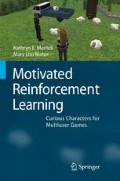Abstract
Games in multiuser virtual worlds are rapidly introducing new demands on artificial intelligence technologies. As the 3D graphics technology improves the visual quality of non-player characters, there is an expectation that the quality of their behavioural intelligence will also improve. Likewise, because virtual worlds are shared between human-controlled characters and computer-controlled characters, the comparisons between the two will be more common. The task of building believable characters is becoming more and more challenging as the technology around them changes.
Access this chapter
Tax calculation will be finalised at checkout
Purchases are for personal use only
Preview
Unable to display preview. Download preview PDF.
References
O. Macindoe, M.L. Maher and K. Merrick, Agent Based Intrinsically Motivated Intelligent Environments, Handbook on Mobile and Ubiquitous Computing: Innovations and Perspectives, American Scientific Publishers, 2008 (to appear).
J. Chen, Flow in games. http://www.jenovachen.com/flowingames/about.htm, (Accessed July, 2008)
A. Doull, The death of the level designer: procedural content generation in games. http://roguelikedeveloper.blogspot.com/2008/01/death-of-level-designer-procedural.html (Accessed July, 2008).
N. Gu and M.L. Maher, A grammar for the dynamic design of virtual architecture using rational agents. International Journal of Architectural Computing 4(1):489–501, 2004.
R. Saunders and J.S. Gero, Curious agents and situated design evaluations. In: J.S. Gero and F.M.T. Brazier (Eds.), Agents in Design, Key Centre of Design Computing and Cognition, University of Sydney, pp. 133–149, 2002.
A. Maslow, Motivation and personality, Harper, New York, 1954.
R.A. Brooks, How to build complete creatures rather than isolated cognitive simulators. In: K. VanLehn (Ed.), Architectures for Intelligence, Lawrence Erlbaum Associates, NJ, pp. 225–239, 1991.
R.A. Brooks, M. Coen, D. Dang, J. DeBonet, J. Kramer, T. Lozano-Perez, J. Mellor, P. Pook, C. Stauffer, L. Stein, M. Torrance and M. Wessler, The intelligent room project, The Second International Cognitive Technology Conference (CT97), Aizu, pp. 271–279, 1997.
K. Merrick, M.L. Maher and R. Saunders, Achieving adaptable behaviour in intelligent rooms using curious supervised learning agents, CAADRIA 2008, Beyond Computer Aided Design, Chiang Mai, Thailand, pp. 185–192, 2008.
M.L. Maher, K. Merrick and O. Macindoe, Intrinsically motivated intelligent sensed environments, EGICE 2006, Springer-Verlag, pp. 455–475, 2006.
Author information
Authors and Affiliations
Corresponding author
Rights and permissions
Copyright information
© 2009 Springer-Verlag Berlin Heidelberg
About this chapter
Cite this chapter
Merrick, K.E., Maher, M.L. (2009). Towards the Future. In: Motivated Reinforcement Learning. Springer, Berlin, Heidelberg. https://doi.org/10.1007/978-3-540-89187-1_10
Download citation
DOI: https://doi.org/10.1007/978-3-540-89187-1_10
Published:
Publisher Name: Springer, Berlin, Heidelberg
Print ISBN: 978-3-540-89186-4
Online ISBN: 978-3-540-89187-1
eBook Packages: Computer ScienceComputer Science (R0)

